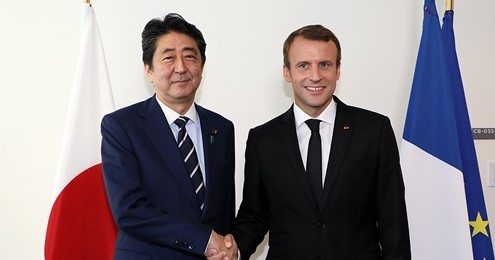Macron in Japan: Upgrading the Franco-Japanese Strategic Partnership in the Indo-Pacific

On June 26, French President Emmanuel Macron will make his first, what is deemed to be a long overdue visit to Japan, a year after his previous travels to Asia led him to China (January 2018), India (March 2018), and Australia (May 2018).

Arguably, his belated visit does not reflects a lack of interest or engagement in bilateral relations with Tokyo. Since his election, Macron has met six times the Japanese Prime Minister Shinzo Abe, who was invited as guest of honor to Bastille Day last year. In 2018, the two countries celebrated the 160th anniversary of their bilateral relations, and the partnership is advancing on all fronts: from economic cooperation, with the implementation of the EU-Japan Economic Partnership Agreement, to an ambitious space agenda.
A new roadmap to expand the cooperation for the next five years will be adopted during Macron’s visit. But the most promising area to upgrade the “Exceptional Partnership” is likely to be maritime security cooperation in the Indo-Pacific area.
Japan stands out as a key partner as France has been recently developing an Indo-Pacific strategy. The French government has shown its resolve to step up its diplomatic and security commitments in this vast area where it has 1.6 million citizens, territories, and a large Exclusive Economic Zone. Key challenges such as China’s maritime expansion and growing constraints on the freedom of navigation, crimes at sea, proliferation of Weapons of Mass Destruction, terrorism, but also natural disasters and pressure on maritime resources are increasingly putting French interests at risk. In response, Paris wants to foster a multipolar, rules-based Indo-Pacific in partnership with like-minded countries.
President Macron highlighted in May 2018 the “Paris-Delhi-Canberra axis” in this regards, and Japan is likely to be identified as the third key coordinating partner. Indeed, Paris and Tokyo, two liberal democracies, share a number of common concerns regarding unilateral challenges to the international order and the possible advent of what many observers view as an illiberal Chinese hegemony in the region. France and Japan’s security cooperation has been steadily expanded and formalized, with an annual 2+2 Dialogue at the ministerial level since 2014, an agreement on the transfer of defense equipment and technology (2016) and an acquisition and cross-servicing agreement (ACSA) (2018). Joint exercises have been upgraded, from Japanese participation in multinational humanitarian assistance and disaster relief (HA/DR) exercises held by France in the South Pacific to exercises of control at sea with the Frigate Vendemiaire in 2018 and 2019. As Japan has been diversifying its security partnerships beyond its U.S. ally to include India, Australia and the UK, among others, it also allowed Japan and France to hold quadrilateral drills with the U.S. and U.K. near Guam in 2017. This year, combined naval exercises gathered the French aircraft carrier Charles de Gaulle with a Japanese helicopter carrier, a U.S. guided missile destroyer and an Australian submarine in the Indian Ocean.
Tokyo is increasingly seen by Paris as a crucial and active player to coordinate with, as part of a wider network of strategic partners that will help to compete with China on a level playing field and allow for a division of labor in the vast Indo-Pacific area.
Related centers and programs
Discover our other research centers and programsFind out more
Discover all our analyses
China’s Strategy Toward Pacific Island countries: Countering Taiwan and Western Influence
Over the past decade, China has deployed a diplomatic strategy toward the Pacific Island Countries (PICs). This strategy pursues two main objectives: countering Taiwan's diplomatic influence in the region and countering the influence of liberal democracies in what Beijing refers to as the "Global South."

Opening up the G7 to South Korea to Address Contemporary Global Challenges
The G7’s global influence has diminished as powers like China reshape international governance through initiatives such as BRICS and the Shanghai Cooperation Organisation (SCO). With the G7 now representing just 10 per cent of the world’s population and 28 per cent of global GDP, its relevance is increasingly questioned.
Expanding SPDMM as a pivotal institution in the Pacific – A French perspective
The South Pacific Defence Ministers’ Meeting (SPDMM) is the only forum that brings together defense ministers from the wider South Pacific — including Chile, which is hosting it for the first time. This heterogeneous group of countries with varying resources, capacities, and interests — Australia, Chile, Fiji, France, New Zealand, Papua New Guinea (PNG), and Tonga — are united by their shared determination to strengthen cooperation on maritime security and humanitarian assistance and disaster relief (HADR) activities.
EU’s Derisking From China: A Daunting Task
With economic security as a major concern, the EU has recently turned to “derisking” from China. The EU strategy entails reducing critical dependencies and vulnerabilities, including in EU supply chains, and diversifying where necessary, while recognizing the importance and need to maintain open channels of communication.











